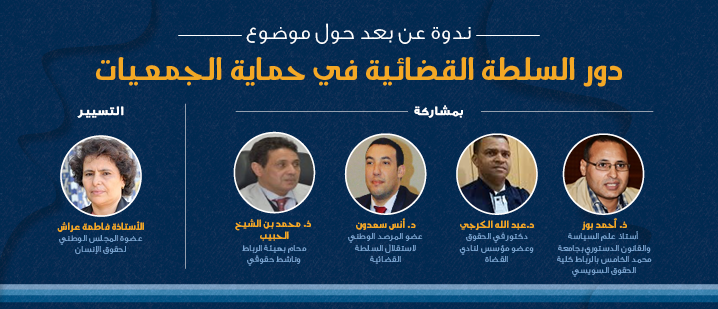Advocating for the necessity to harmonize the Law on Associations with the requirements of the 2011 Constitution and with relevant international standards

You can watch this event at: https://urlz.fr/f23K
The National Human Rights Council (CNDH) organized, on Friday 26 February 2021, an online seminar on the role of the judiciary in protecting associations. On this occasion, participants addressed issues related to forming associations between the judiciary and the administration, the role of the Public Prosecution in the process of community life, the role of justice in disputes between individuals and administration, and the judicial and legal protection.
In his statement, Dr. Anas Saadoun, member of the National Observatory for the Independence of the Judiciary “known under its French acronym (ONIPJ)”, underlined complexities facing forming associations in Morocco. He also called for the necessity to harmonize the Moroccan Law on Associations with the requirements of the 2011 Constitution and the relevant international standards.
Moreover, Dr. Saadoun stressed that the rule is the freedom to form associations and the freedom of the civil society action while restriction should be the exception and should be governed by legality, necessity and proportionality.
For his part, Judge Abdellah Borji highlighted the role of the judiciary in disputes between associations and the administration. He addressed a set of rulings in favour of the right of citizens to form associations. Besides, he recommended finding a legislative solution that defines precisely some ambiguous concepts and empowering judges in the area of the implementation of international conventions ratified by Morocco and the relevant international instruments.
Professor Mohamed Ben Chiekh, Attorney and civil society activist, shed light on judicial and legal protection in practice. He stressed that the European Court of Human Rights considers that the legislative texts related to the freedom of associations and the methods of their implementation by public authorities are among the indicators and basic elements used to identify the state of democracy in a country.
Furthermore, Mr. Ben Cheikh presented some practical problems facing associations that couldn’t have their final receipt such as obtaining support, opening a bank account or renting a local... He also said that depriving NGOs of the final receipt is sentencing them to death and disrupting their activities, etc.
Dr. Ahmed El Bouz, University Professor, indicated that Moroccan justice ruled in favour of most cases the freedom of forming associations and their freedom to practice their activities. It also reformed the administration and confirmed that local authority has only the right to a posteriori check-up by referring any illegal matter to the competent judicial authority. However, he noted that there are some jurisprudence deviations that ruled that refusing the final receipt is not subjected to appeal due to the lack of interest.
In its annual report on the human rights situation in Morocco for the year 2019, the CNDH recommended encouraging associations to access the administrative judiciary as a mechanism for redressing disputes between administrative authorities and associations by implementing judicial rulings and decisions issued in favor of associations. The CNDH also called for encouraging dialogue between public authorities and associations to overcome obstacles that prevent associations from exercising their roles.
On the other hand, the CNDH recommended reviewing legal requirements related to the procedures for forming and renewing, and financing associations in a way that ensures the exercise of freedom of association following the Constitution and the International Covenant on Civil and Political Rights. It also recommended reviewing the legal provisions related to associations by replacing freedom-depriving penalties with fines, etc.






















